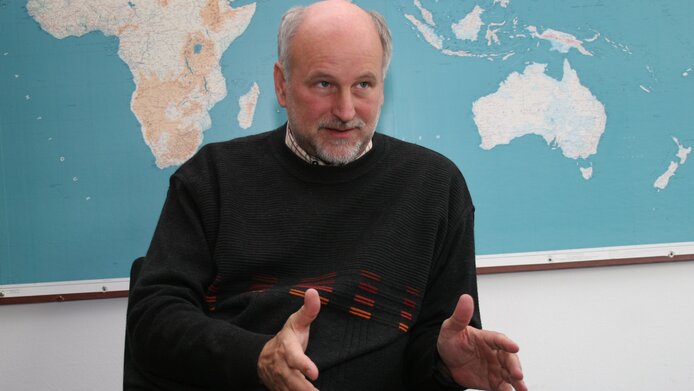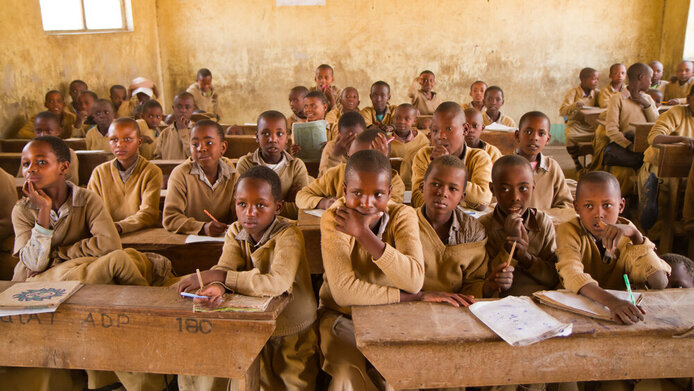At the epicentre of demography

He is currently one of the most coveted interview partners when the issue is refugee flows towards Europe: Wolfgang Lutz, founder and head of the Wittgenstein Center for Demography and Global Human Capital. Located on the campus of the Vienna University of Economics (WU), the Center is home to research teams working on topics such as demographic development, health, education policy, age, migration and education - urgent questions for both politics and society given a growing world population and an increasing scarcity of resources. The mission of the Center is to provide demographic analyses of human capital formation and its impact on society and the economy. When it comes to the refugee flows, two perspectives are of concern: what are the conditions in the receiving countries and will they succeed in integrating the new arrivals? And secondly: how will the situation develop in the countries of origin?
Literacy and welfare
Lutz explores the connection between the level of education of a population (the human capital) and the economic development of the country. Analyses have shown clearly that it is not the education of an elite that drives the economic development of a society, but the education level reached by large parts of the population. “It was universal literacy among the population that enabled economic development in Europe”, is the historical comparison the expert uses to illustrate his point in the interview with scilog. He notes that the first countries initiating this development were the Protestant countries and their motivation was a religious one. “During the Reformation, people were encouraged to learn to read and write in order to be able to read the Bible themselves”, explains Lutz. More recent examples he quotes include countries such as South Korea, Singapore or Mauritius. “In the 1960s, Mauritius was poorer than many other African countries. Within only 50 years, universal education enabled the country to experience an economic upswing.”
An investment in education and health
This is why Lutz is a proponent of targeted aid when it comes to the controversial question of development aid yes or no: “Investments should be made in basic education and basic health. In this way you enable people to be masters of their own fate and to develop not according to Western prescriptions but according to their own culture”, Lutz observes.
The mathematics of human beings
Lutz, born in Rome and having grown up in Germany and Vienna, is the son of a historian. He started at an early age to explore these fundamental social questions. Inspiration came from the book The Limits of Growth by the Club of Rome which he read at the age of 16. This is why Lutz started out by studying theology, philosophy and mathematics – combining the qualitative and quantitative approach, so to speak. Ultimately he was able to cater to both interests by studying demography, which he calls “the mathematics of human beings”.
Demographic transition
The demographer distinguishes between the current unpredictable flows of refugees caused by war, which are a “humanitarian emergency”,
and the flows of migration to be expected from developing and emerging countries as a consequence of non-simultaneity in demographic transition. “Demographic transition is the process where you first see a decrease in mortality rates and then – with a delay of some decades – in birth rates. During the time when birth rates are still high but mortality rates are already going down, the population grows very quickly”, explains Lutz, who gives another historical comparison: “In Austria, we were in that phase around 1900, and there were massive waves of emigration towards the American continent. We sometimes tend to forget this today. Back then, the Austrians were lucky in that there were empty continents where they were welcome.”
"So much depends on education"
Whether birth rates are going to decline depends decisively on general education – and especially on the education level of women. “In many African countries school enrolment rates rose after 2000, then stagnated with the economic crisis of 2007, and are partly dropping again now ”, comments Lutz on statistics and worries: “That is the worst that can happen. So much depends on education: health, life expectancy, jobs, income – and even democratisation. Only mature citizens make a modern democracy possible.” And what if this will not succeed in the African countries? “If the population of Africa triples on top of climate change and dwindling resources, great problems lie ahead. It will have to be seen whether people will perish in silence where they are or whether they have the energy and the money to make it to Europe”, warns Lutz.
Education and integration
According to Wolfgang Lutz; the successful integration of immigrants will also depend on education. Not just the education level of those arriving, but also of the people living in the receiving countries, because “educated people are usually more flexible”, notes the expert. As far as the receiving countries are concerned he considers the prerequisite to be a certain basic consensus in society, solidarity. More affluence equals more opportunities, but also more inequality. As a trained theologian, Lutz also addresses the ethical dimension: “It’s about finding the right measure: growth for all, but without excessive inequality”. As successful examples Lutz quotes once again the Nordic countries. According to him they offer a society with relatively homogeneous opportunities – at a very high economic and technological level. But what is it that Scandinavians do differently? “They reached a high general education level very early on, resulting in an early homogeneous culture – not a class culture as in our case – where commonalities were uppermost, where everyone became part of the middle-class if you like”, explains Lutz.
Circular migration
A new phenomenon caused by increasing mobility is what experts call “circular migration”. People come for a few years, earn money, send the money home to help their families and then go back to their countries of origin, taking their experience and contacts with them. “If managed well, circular migration is of mutual benefit. This is a positive pattern, and this is the direction where things are increasingly heading”, says Lutz.
Back on the agenda
When the expert, now aged 58, came back to Austria, there was “virtually nothing” in the field of demography. This had historical reasons: “During the Nazi era, demography focused on questions such as ‘racial hygiene’ and – rightly – disappeared from view after the Second World War”, recounts Lutz. “If it had not been for the IIASA in Laxenburg, where Nathan Keyfitz, a professor emeritus from Harvard, had just started to head the World Population Program, I would probably have returned to the US”, he recollects. It is thanks to Wolfgang Lutz that demographic research in Austria today has close links to academia, with the Center located at the Vienna University of Economics (WU), and thus has the chance of training young researchers.
Epicentre of demography in Europe
In 2011, the much acclaimed and renowned scientist founded the Wittgenstein Center - from the endowment of the Austrian Science Fund’s (FWF) Wittgenstein Award, an award he had received in 2010. It was his declared aim to combine the skills of three research teams he had previously headed: the Vienna Institute of Demography at the Austrian Academy of Sciences, the World Population Program of the International Institute for Applied Systems Analysis (IIASA) in Laxenburg, as well as the WU’s demography department. August 2014 saw the first major publication of the Wittgenstein Center, entitled World Population & Global Human Capital in the Twenty-First Century, which analysed scenarios of human capital development for all countries of the world. Today Vienna is considered the epicentre of demography in Europe.
Head of the IIASA World Population Program since 1994, Wolfgang Lutz has held the position of Director of the “Vienna Institute of Demography” (VID) at the Austrian Academy of Sciences (ÖAW) since 2002 and that of a professor at the Vienna University of Economics since 2008. Among numerous other distinctions he received the European Research Council’s ERC Advanced Grant in 2008 and the Wittgenstein Award of the Austrian Science Fund FWF in 2010. In 2010, he used the funds from these grants to bundle the research institutions under the umbrella of the Wittgenstein Centre for Demography and Global Human Capital. Lutz studied theology, philosophy, mathematics and statistics at the universities of Munich, Vienna and Helsinki, as well as demography at the University of Pennsylvania. He is the father of two adult sons.
More Information







